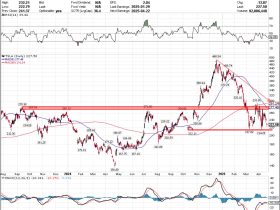The head of Zopa has suggested that London’s political and regulatory stability could become a competitive advantage for the capital’s financial markets, as businesses increasingly look to escape growing uncertainty in the United States.
Jaidev Janardana, chief executive of the digital bank, said concerns around a volatile tax and tariff regime in the US had prompted his company to reconsider the appeal of listing in New York. “I would be surprised if that’s not the case more generally as well,” he added, referring to other globally-minded businesses.
Zopa, which achieved unicorn status with a $1 billion valuation in its last funding round, has long been considered a strong IPO contender. However, Janardana made clear that the current climate made a flotation unlikely in 2025, noting that “an IPO is not a priority” while market sentiment remains subdued.
Even so, he struck an optimistic tone about the prospects for a future listing, possibly as early as next year. “I’m optimistic that maybe [at the] back end of this year, maybe early next year, things will start to look better for UK-listed companies,” he said.
London’s reputation for rule of law and political predictability could become increasingly important for firms navigating geopolitical turbulence, Janardana suggested. “Respect for rule of law [is] some of the things people will start to appreciate more, given the way the world is going.”
Despite Zopa’s international investor base – which includes Japanese investment giant Softbank – Janardana said the UK focus of the business makes a London IPO more logical. Still, he added, “we’ll keep our options open”.
He welcomed recent reforms aimed at making the City more competitive but warned that companies themselves must take responsibility for restoring confidence in London listings. “Part of the reason why some of the UK IPOs have struggled is that companies haven’t delivered on the expectations that were there,” he said.
Founded in 2005 as the world’s first peer-to-peer lending platform, Zopa transitioned to a fully-fledged bank in 2020. Today, it offers personal loans, savings products and credit cards to over 1.3 million customers, and holds more than £5 billion in deposits. In 2023, it posted a maiden pre-tax profit of £15.8 million, supported by rising net interest income.
Its latest financial results are due to be published on Thursday. In December, the company secured £68 million in new capital from investors including AP Moller Holding, the owner of Maersk. Janardana confirmed that Zopa does not anticipate returning to the market for further fundraising until at least next year.
While the bank has benefited from higher interest rates, Janardana said a cut in borrowing costs would be welcome if it encouraged consumer demand. “Appetite for borrowing has been weaker since the start of the year,” he noted, pointing to lower confidence and the knock-on effects of employer national insurance hikes, which he said had dampened wage growth expectations.
Addressing concerns over the economic impact of potential Trump-led US tariffs, Janardana struck a surprisingly upbeat note. He argued that the inflationary impact on the UK would be minimal, and might even have a deflationary effect. “Higher levies that might be applied to other countries could make trade between Britain and other markets easier and cheaper,” he said.
Read more:
London IPO market could thrive as US instability mounts, says Zopa chief











